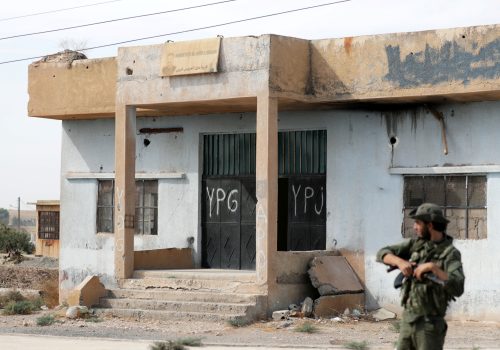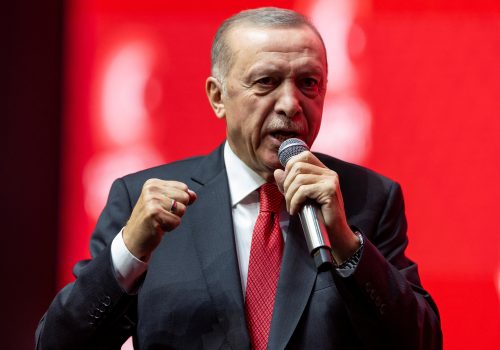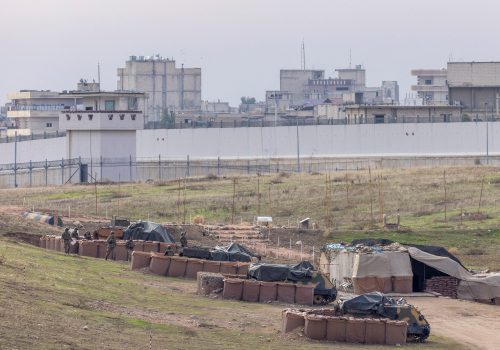Experts react: How the world should respond to the devastating earthquake in Turkey
This post was updated at 4:40 p.m. ET on Monday.
A 7.8-magnitude earthquake in southeastern Turkey on Monday, followed by a large aftershock, killed thousands and caused widespread devastation in both Turkey and Syria. As locals pick up the pieces and aid groups rush in, how can the international community help? What will the impact be for a region already reeling from a decade-long war and refugee crisis? Our experts on Turkey and the wider region deliver the answers.
Yevgeniya Gaber: Watch out for political manipulation of the tragedy
Borzou Daragahi: The widespread damage could have been avoided
Rich Outzen: With global help needed to rescue trapped people, regional tensions could ease
Eser Özdil: Aid contributions will help build diplomatic ties
Watch out for political manipulation of the tragedy
The tragedy has mobilized Turkey’s allies to join together in solidarity. More than forty-five countries have already extended their condolences and offered help to Turkey. In Ukraine, where people know well how it feels to wake up to the shouts of those trapped under the rubble of leveled buildings, many have joined a campaign to garner assistance to those affected in the devastating earthquake, while political leadership expressed readiness to send a large group of rescue workers to Turkey to assist in the crisis response. Ukrainians’ hearts and prayers have been with Turkey today.
With so much happening in the region, it is important to make sure that the cost of human lives is not depreciated, people’s deaths do not become mere figures in statistics, and necessary lessons are learned. There is also a risk that the devastating consequences of the earthquake, just months ahead of critical elections, will be used for political manipulations and information operations—both internally and externally. Just hours after the tragedy, Russian Telegram channels and think tanks have published similar messages urging Turkish President Recep Tayyip Erdogan to take this opportunity to renew direct talks with Syria’s Bashar al-Assad, claiming this would be a good time for a coordinated Turkish-Russian-Syria response. This was followed by a phone conversation between Erdogan and Russian President Vladimir Putin. At the same time, there are an increasing number of social media posts sharing conspiracy theories on the possible “man-made” character of the catastrophe, allegedly aimed at weakening Turkey after rising tensions with its Western allies. These malign efforts to influence public perception about the tragedy should be taken seriously.
—Yevgeniya Gaber is a nonresident senior fellow at the Atlantic Council IN TURKEY and at the Center in Modern Turkish Studies, Carleton University. Previously she was a foreign-policy adviser to the prime minister of Ukraine. Follow her on Twitter @GaberYevgeniya.
The widespread damage could have been avoided
If just one building collapses in a known earthquake zone, it is a tragedy. If dozens across several major cities collapse, it signals a preventable tragedy. Turkey vowed to implement changes to its building practices following the tragic 1999 Kocaeli province earthquake that left seventeen thousand dead. It instituted new construction rules and implemented mandatory earthquake insurance for all buildings. Architects and urban planners have been warning for years that the rules are not being followed strictly enough. This is an issue that cuts across Turkey’s partisan divide and needs much greater public scrutiny ahead of the May 14 elections.
—Borzou Daragahi is a nonresident senior fellow with the Atlantic Council’s Middle East Programs and an Istanbul-based journalist writing for the Independent.
With global help needed to rescue trapped people, regional tensions could ease
These devastating earthquakes have killed at least two thousand people and injured over eight thousand according to Monday’s reporting, with totals likely to rise. Turkey, unfortunately, has experience with severe earthquakes and has sophisticated emergency-response mechanisms. Yet there will be a need for technical assistance from neighbors and allies for time-sensitive tasks such as extricating people trapped under damaged and collapsed buildings. Azerbaijan, Israel, many European countries, and others have offered the rapid deployment of teams for this sort of work. It is worth remembering that millions of Syrian refugees live in southern Turkey, and there is a role for European donors as well as the Turkish government to help Syrians who live alongside Turkish neighbors in the affected area, but also across the border in northern Syria, which has also seen widespread destruction.
Sympathetic and supportive messages from across the region, including Athens, remind us that tragedies can also create a sense of solidarity in times of crisis. There may be some softening of heretofore tense regional relations in the aftermath and during the recovery process.
—Rich Outzen is a geopolitical consultant and nonresident senior fellow at the Atlantic Council IN TURKEY with thirty-two years of government service both in uniform and as a civilian. Follow him on Twitter @RichOutzen.
Aid contributions will help build diplomatic ties
Turkey is once again faced with the devastating effects of an earthquake, this time epicentered on Kahramanmaraş, in the southeastern region of the country. The earthquake also affected highly populated cities including Gaziantep, Şanlıurfa, Antakya, Adana, and Malatya. It is cold in the region at the moment, and all kinds of humanitarian aid are needed. Although Turkey has extensive experience in dealing with similar natural disasters, any support from other countries will make a difference in the field. History has shown us many times that a common struggle in natural disasters such as earthquakes can make positive contributions to the development of relations between countries. I think that countries that show solidarity with Turkey will also improve their bilateral relations.
—Eser Özdil is a nonresident fellow with the Atlantic Council IN TURKEY and the founder and managing director of GLOCAL Group Consulting, Investment, and Trade.
Further reading
Mon, Jan 23, 2023
It’s been over a decade since Ankara and Damascus talked. What changed?
MENASource By Ömer Özkizilcik
The December 2022 meeting in Russia is the first of many that may ultimately result in a direct encounter between Recep Tayyip Erdogan and Bashar al-Assad.
Fri, Jan 27, 2023
What Turkey really wants from Sweden
New Atlanticist By Rich Outzen
Turkey likely will still approve Sweden's bid for NATO membership, but not until summer and only after President Recep Tayyip Erdogan gets more cooperation against the PKK.
Thu, Dec 1, 2022
The risks and rewards of Erdogan’s next military operation
TURKEYSource By Rich Outzen
The November 13 bombing in Istanbul, blamed on the PKK, is spurring a planned Turkish offensive against PKK affiliates in Northern Syria, fulfilling a long term goal to better secure the country's southern border.
Image: People stand in front of collapsed buildings following an earthquake in Kahramanmaras, Turkey February 6, 2023. Ihlas News Agency (IHA) via REUTERS ATTENTION EDITORS - THIS PICTURE WAS PROVIDED BY A THIRD PARTY. NO RESALES. NO ARCHIVES. TURKEY OUT. NO COMMERCIAL OR EDITORIAL SALES IN TURKEY.


